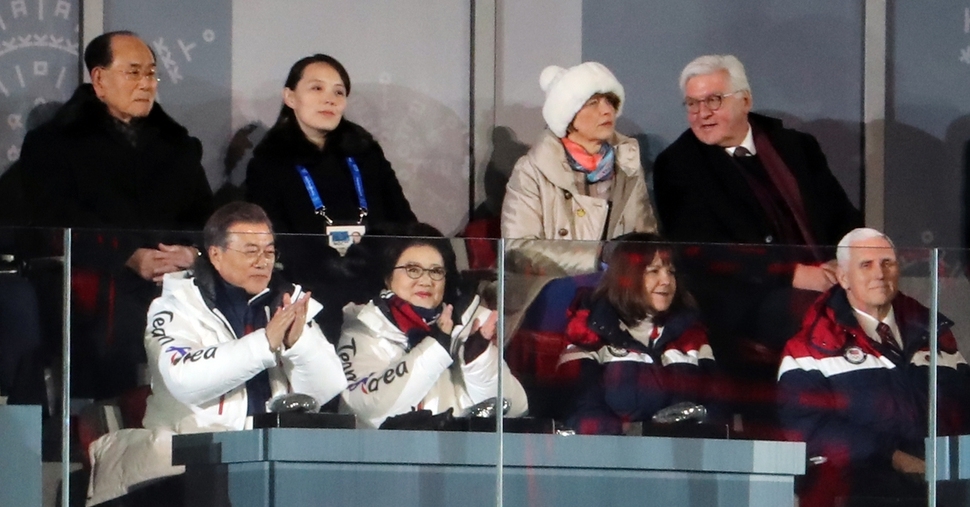Posted on : Feb.22,2018 16:41 KST
Modified on : Feb.22,2018 16:56 KST
 |
|
US Vice President Mike Pence refuses to acknowledge Kim Yo-jong, first vice director of the Central Committee of the North Korean Workers’ Party, or Kim Yong-nam, president of the Presidium of the North Korean Supreme People’s Assembly, as he sits next to South Korean President Moon Jae-in during the opening ceremony of the Pyeongchang Winter Olympics on Feb. 9. (Photo Pool)
|
A meeting was reportedly scheduled at the Blue House on Feb. 10 among US Vice President Mike Pence, Workers’ Party Central Committee first vice director Kim Yo-jong, and North Korean Supreme People’s Assembly Presidium president Kim Yong-nam during their visit to attend the Pyeongchang Olympics opening ceremony, but ended up failing to happen after it was canceled by North Korea. The US State Department effectively confirmed the Feb. 20 report in the Washington Post, saying it “regret[s North Korea’s] failure to seize this opportunity.”
According to the report, discussions on the meeting, which was proposed by North Korea, began two weeks before Pence’s visit. But the North reportedly canceled it two hours beforehand, voicing displeasure over Pence’s meeting with North Korean defectors and declaration of new North Korea sanctions.
Looking back on the situation, it’s hard to fathom why Pence would have done even more than usual to provoke Pyongyang ahead of this meeting. Under the circumstances, the North may have come to the conclusion that it would be better not to meet. That said, it is not diplomatic behavior to cancel a meeting two hours beforehand. Not only could this add to the existing lack of trust in North Korea, but it also provides a rationale for laying blame for the meeting’s failure at Pyongyang’s feet. No matter how infuriated they may be with each other, there would be great meaning in the simple fact of the two sides sitting down at the same table. An opportunity as natural as the Pyeongchang Olympics is unlikely to come along again. It’s disappointing to think how Pyongyang might have approached things more strategically.
In some sense, the belated report in the US press comes across as a PR move by Pence, who has come under fire for his hardline activities in South Korea, to shift responsibility for the failure on to the North. Pyongyang may very well not even try to contact Washington in the future if behind-the-scenes talks toward a meeting that didn’t even occur are going to be announced this way in the press. Quite a few Donald Trump administration figures have been exploiting the situation in foreign affairs for their own domestic political ends. It’s something that could remain a potential risk factor in North Korea-US relations.
What we can draw from this episode, at any rate, is that the US did open up the possibility of preliminary talks with the North. That is only a beginning. Hopefully, both sides will reach out to each other once again with a more open mind. Achieving this will require a flexible and judicious approach in terms of the scale and methods of the joint military exercises that are set to resume after the Olympics end. With Pyongyang and Washington so far apart at present, it is essential for Seoul to play the kind of bridging role that it did here for talks between the two sides. South Korea will need careful strategy and patience as it continues its diplomatic campaign to get North Korea and the US to sit down together.
Please direct questions or comments to [english@hani.co.kr]









